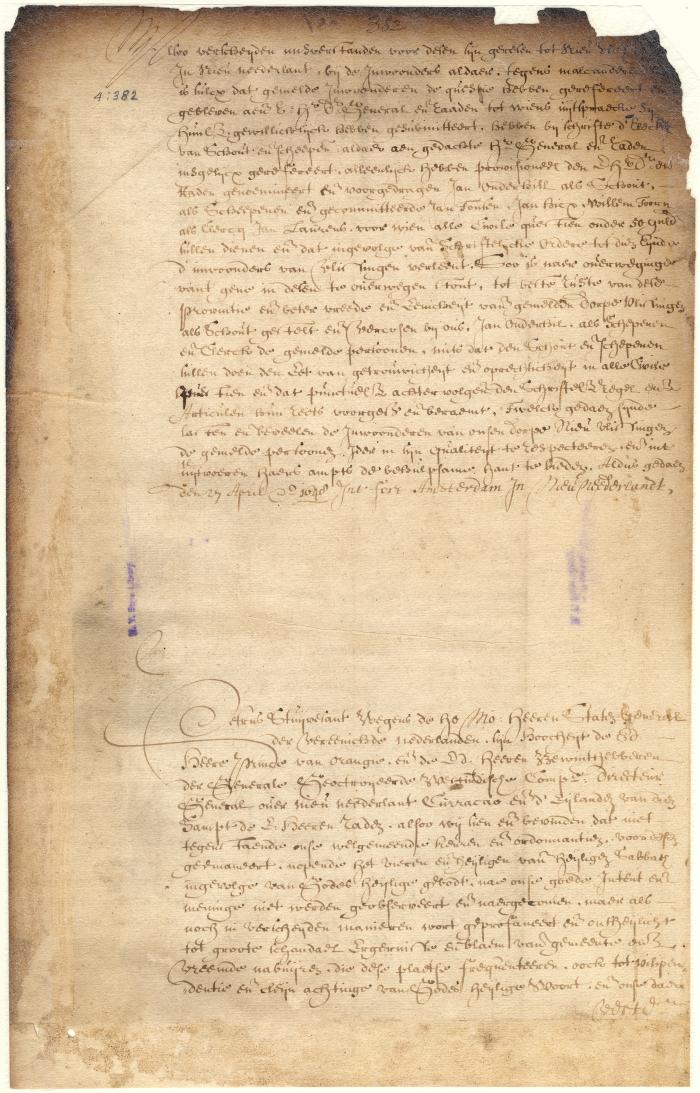[ Appointment of schout and schepens for the town of Flushing ] [1]
Whereas divers misunderstandings have heretofore arisen among the inhabitants of New Flushing in New Netherland, the said inhabitants have, therefore, referred the question to the director general and council, to whose decision they have voluntarily submitted themselves; in like manner they have in writing referred the election of schout and schepens there to the said general and council, having only provisionally named and proposed to the honorable director and council Jan Onderhil as schout; Jan Tonsen, Jan Hicx, Willem Toorn, for schepens and selectmen, and Jan Laurens, for clerk, before whom all civil suits under 50 guilders shall be brought, and that pursuant to the written order to that end granted to the inhabitants of Flushing.
Therefore, after consideration of the matters herein to be deliberated, for the greater tranquility of the province, and the assured peace and unity of said village of Flushing is Jan Onderhil by us chosen and appointed schout, and the said persons schepens and clerk, provided that the schout and schepens shall take the oath of allegiance and uprightness punctually to follow in all civil cases the written rule and articles already issued and enacted for them. Which being done, we charge and command the inhabitants of our town of New Flushing to respect said persons each in his quality, and to lend them a helping hand in the execution of their office.
Thus done the 27th of April anno 1648, in Fort Amsterdam in New Netherlands
[ Ordinance for the better observance of the Sabbath ] [2]
Petrus Stuyvesant, on the behalf of the High and Mighty Lords the States General of the United Netherlands, his Highness the Prince of Orange, and the honorable directors of the General Chartered West India Company, director general of New Netherland, Curaçao and the islands thereof, together with the honorable council.
Whereas we see and find that, notwithstanding our well meant laws and ordinances, heretofore promulgated for the observance and sanctification of the Holy Sabbath in conformity to God's holy command, they are not compiled with and obeyed according to our good intent and meaning, but that it is still profaned and desecrated in divers ways, to the great scandal, offense and reproach of the commonalty and foreign neighbors who frequent this place, the contempt and disregard of God's Holy Word and of our ordinances deduced therefrom; therefore, we, the director general and council aforesaid, in order to avert, as much as in us lies, from us and our subjects the wrath and chastisement of God to be apprehended from these and other transgressions, do hereby renew and amplify our previous edicts and ordinances, having, for the stricter observance thereof, with the pre-advice of the minister of the Gospel, deemed it expedient that a sermon shall be preached from the Sacred Scriptures and the usual prayers and thanksgiving offered from this time forward in the afternoon as well as in the forenoon; wherefore we request and command all our officers, subjects and vassals to frequent and attend the same; meanwhile, in conformity with our aforesaid ordinances, we forbid during divine service, all tapping, fishing, hunting, and other customary avocations, trading and business, either in houses, cellars, shops, ships, yachts, or in the streets and markets, under the penalty of forfeiting such wares, merchandizes and goods, or their redemption with the sum of 25 florins, until further order to be applied to the poor and the Church, and in addition thereto one pound Flemish to be forfeited as well by the buyers as the sellers, by the lessees and by the lessors, to be distributed, one-half to the officer, one-half at the discretion of the court. In like manner, also, we do hereby interdict and forbid all persons on the aforesaid day to spend their time to the shame and scandal of others in gross drunkenness and excess, on pain, if so found, of being arrested by our fiscal or any superior or inferior officer, and arbitrarily punished by the court.
Thus done and, after reconsideration, enacted and published the 29th April anno 1648, in New Amsterdam in New Netherland.
On the 3d of May 1648
The honorable director general protests in council against Mr. Lubbert van Dincklagen, because he refuses to testify to the truth of what occurred in council on the 2d of May between the fiscal, Commissary Keyser and Pauwelis Leendersz, naval store keeper.
Rights: This translation is provided for education and research purposes, courtesy of the New York State Library Manuscripts and Special Collections, Mutual Cultural Heritage Project. Rights may be reserved. Responsibility for securing permissions to distribute, publish, reproduce or other use rest with the user. For additional information see our Copyright and Use Statement Source: New York State Archives. New York (Colony). Council. Dutch colonial council minutes, 1638-1665. Series A1809-78. Volume 4, page 382-383.



